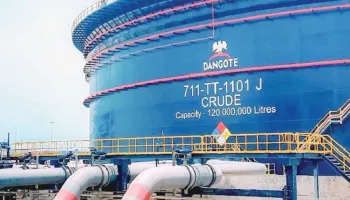The Dangote Group has appointed seasoned industry expert David Bird as the Chief Executive Officer of its fuels and petrochemicals division, signifying a key leadership transition.
In a strategic leadership shift, the Dangote Group has appointed Bird, a seasoned refinery executive and the former head of Oman’s Duqm refinery project, as the new Chief Executive Officer of its refining business. Bird assumed the position in July 2025, bringing with him a wealth of experience from his tenure at OQ8, where he was a central figure in overseeing the planning, commissioning, and early-stage operations of the Duqm refinery—a project known for its complex processing capabilities and international relevance.
Dangote Refinery Ceo Appointment — David Bird
His appointment coincides with a critical phase for the $20 billion Dangote refinery complex, located in Lekki, Lagos, Nigeria. The massive facility, which has been described as the world’s largest single-train refinery, was officially commissioned in January 2024 and has since been gradually ramping up production amid significant domestic and global attention.
Aliko Dangote, the billionaire industrialist and Africa’s wealthiest man, continues to serve as Chairman of the Refinery Division and retains his role as Chief Executive Officer of the larger Dangote Group, which spans multiple sectors including cement production, fertiliser manufacturing, and sugar refining.
David Bird’s leadership is expected to bring a new strategic direction to the refinery operations. He is known for his trading-focused leadership style, deep knowledge in diversifying crude feedstocks, and a strong emphasis on boosting operational efficiency. These attributes are particularly valuable as the Dangote refinery grapples with early technical obstacles, including equipment design flaws and operational instability, which have slowed the pace toward reaching full operational capacity at its projected 650,000 barrels-per-day (bpd) output.
In a statement shared with S&P Global Platts, David Bird expressed his commitment to improving the refinery’s performance and expanding its influence across the African continent. “My goal is to maximise output while streamlining operations for optimal performance,” he stated in a LinkedIn post. He added that a key part of his vision is to extend the company’s footprint beyond Nigeria and solidify Dangote Refinery’s position as a regional leader in refining and petrochemicals.
David Bird’s Economic Addition
David Bird’s arrival comes at a particularly delicate time for the facility. While the refinery has already made a considerable impact by reducing Nigeria’s reliance on imported fuel—traditionally a major source of economic strain—it continues to experience disruptions such as “unit upsets” and engineering issues, as noted by S&P Global.
According to S&P Global’s Commodities at Sea platform, the Dangote refinery was the only refinery in Nigeria producing refined petroleum products in July 2025, at a time when Nigerian National Petroleum Company (NNPC) refineries remained idle. During this period, Dangote’s facility exported an estimated 220,000 bpd, with the bulk of shipments comprising jet fuel (45%) and gasoil (24%), while an additional 30,000 bpd of residual fuel oil was exported due to limitations in the plant’s RFCC (residual fluid catalytic cracking) capabilities.

Navigating Nigeria’s regulatory landscape and fuel pricing environment will be one of the major tests for David Bird’s administration. While the Nigerian government has officially ended the long-standing petrol subsidy regime, market observers claim that informal price distortions and rent-seeking behaviours continue to pose challenges. Aliko Dangote himself has previously spoken out against substandard fuel imports and unfair trade practices, which he claims undermine the profitability and viability of local refining operations.
A further challenge lies in the refinery’s supply framework. The company has a naira-based crude oil supply agreement with the NNPC, which holds a 7.2% equity stake in the refinery. This arrangement obliges the Dangote refinery to allocate a set volume of refined fuel products to the Nigerian domestic market. While it helps meet national energy demands, it also limits the refinery’s flexibility to adjust product pricing and crude sourcing strategies in line with international market trends.
David Bird’s Background
To overcome these constraints, the Dangote refinery has already begun processing a wider range of crude oil grades than originally intended. Although the plant was primarily designed to handle Nigerian crude, the irregularity in local crude supply has necessitated sourcing from other regions. This diversification aligns well with Bird’s background at Duqm, where he successfully managed a complex blend of crude types to maintain consistent refinery throughput.
Looking ahead, the Dangote Group is doubling down on infrastructure development and supply chain enhancement to support its refining operations. Plans are currently underway to expand the facility’s capacity from 650,000 to 700,000 bpd. In addition to boosting output, the group is also investing in port infrastructure upgrades and strategic international storage hubs, including facilities in Namibia and other African countries, to improve export logistics.
In a bold logistical move, the group will also launch its own fuel distribution network in August 2025. This initiative involves deploying a fleet of 4,000 compressed natural gas (CNG)-powered trucks, aimed at strengthening internal distribution channels, reducing costs, and minimizing reliance on third-party transporters, who are often subject to market volatility and logistical bottlenecks.
Significance of David Bird’s Appointment to Dangote Group
Meanwhile, the Dangote Group is actively preparing to take its refining division public. During a public address on July 22, Aliko Dangote reiterated the company’s intention to list its refining business on both the Lagos and London stock exchanges. This move is expected to attract international investment, enhance corporate transparency, and support the long-term growth of the company as it scales operations and extends its influence beyond Nigeria.
Industry analysts are closely watching David Bird’s tenure, considering his proven leadership during the Duqm refinery’s critical commissioning and test operation phases in 2023. His appointment signals a commitment by the Dangote Group to professionalise operations further and strengthen the refinery’s global competitiveness at a time when energy transformation and regional industrialisation are top priorities for African economies.



One thought on “Dangote Appoints David Bird EX-Shell Executive as New CEO Of Refinery”